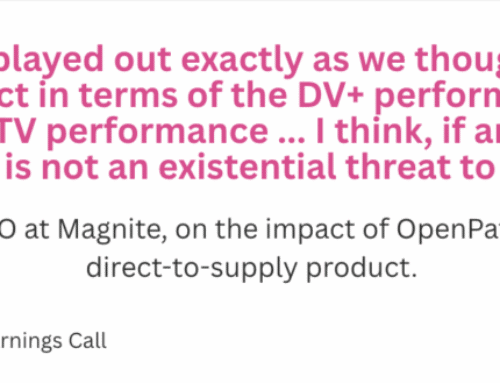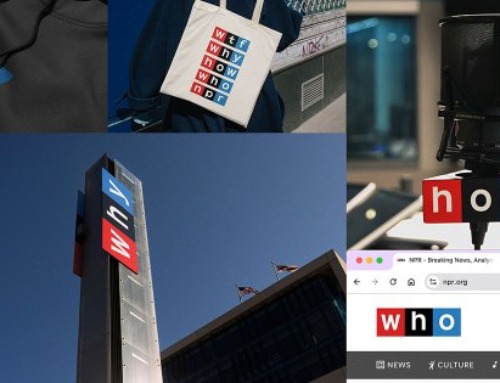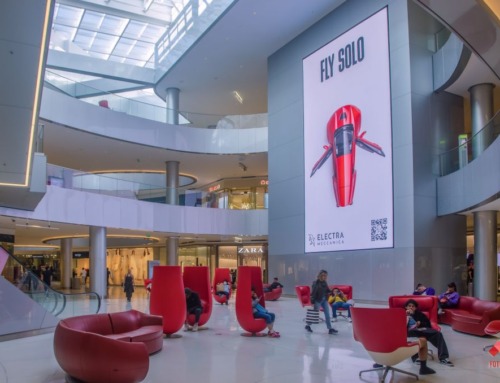Lab Weekly — 09/26/2025 2025 retail trends; new Floor 9 episode; Plus, the latest news about Google’s Live Search, ChatGPT Pulse, and more must-know news and stats
Want this newsletter in your inbox every week? Sign up for our mailing list here

From the expanding definition of value-driven shoppers, to the rise of channel-less retail experiences, here are some of the latest retail trends that brands should know

The new Meta Display glasses look impressive, but can Meta’s AI keep up with its ambition?
What Marketers Need to Know about the iPhone 17 Event
Apple pitches creator-friendly camera features, new wearable health features, and live translation
On the Cultural Fatigue around AI
After years of breathless hype, the broader public is growing skeptical of the lofty promises of AI and increasingly critical of tech companies pushing AI without delivering tangible quality-of-life improvements. For brands, AI fatigue is starting to erode consumer trust.

Welcome back to the latest episode of Floor 9! In this episode, recorded on Thursday Sep. 18, Tom and Ryan, the power duo of our partnerships team, are joined by Lab’s managing director Adam to recap and discuss the latest announcements from Apple’s iPhone 17 event and the Meta Connect event.
Starting with Apple’s new products, including the iPhone 17, new Apple Watch features, and the latest AirPods, the Lab team share their thoughts on some of the most exciting updates, such as the AirPods’ new live translation feature.
The discussion then shifts to Meta’s new Display AI glasses, debating their potential use cases and whether they justify the $800 price point. The hosts also touch upon Meta’s focus on AI and how that compares to Apple’s more conservative approach. The episode concludes with a broader conversation on the future of personal computing and whether wearable technology will one day replace smartphones for certain tasks.

Google is rolling out Search Live nationwide in the U.S., enabling conversational, AI-powered searches that answer your questions in real time while also showing relevant web links. You can try the feature out by opening the Google app on Android and iOS, and then tap the new “Live” button beneath the search bar.
This marks a significant step forward in AI search, as it turns search from static, one-off queries into a real-time conversation that can respond contextually using the camera as an input device. If Google can successfully scale this feature to millions of users, we will step toward agentic search that guides you to get things done, not just find relevant information.
Related: Google Search can now send alerts when products drop to a certain price [PC Mag]; “Play Games Sidekick” is Gemini Live for Android games [9to5Google]; Google is adding Gemini to Google TV [The Verge]
OpenAI Launches ChatGPT Pulse To Proactively Write You Morning Briefs [TechCrunch]
OpenAI has introduced ChatGPT Pulse, a mobile-only feature for paid users that delivers daily personalized updates based on their chats, feedback, and connected apps. This experimental feature turns ChatGPT into a proactive assistant that quietly researches on your behalf and delivers personalized updates each morning. Early demos reportedly ranged from travel and dining tips to tailored news briefings.
Pulse is best read as a step in the direction of AI agents. OpenAI, plus its rivals like Anthropic and Google, are all pouring resources into AI agents that don’t just summarize news but do things on your behalf. The endgame is consumer-facing AI agents that can draft business decks, book travel, grab restaurant reservations, purchase gifts, and generally turn intent into action. With this goal in mind, “morning news briefings” would serve as a safe launchpad for more complicated agentic tasks to come.
Related: OpenAI reportedly signed a contract with Oracle to buy $300 billion in computing power over roughly five years in one of the largest cloud contracts ever [WSJ]; OpenAI is building a ChatGPT for teens [Axios]
Uber Launches Prepaid Passes For Frequent Routes [The Verge]
Uber is introducing prepaid ride passes, which offer bundles of 5, 10, 15, or 20 trips that discount frequent routes by about 5% to 20%. It is also expanding Price Lock so riders can lock fares on up to 10 routes for $2.99/month. These moves target commuters who want predictable costs and relief from surge pricings.
The playbook here is to trade a bit of margin for repeated business and loyalty, converting volatile, surge-averse riders into reliable subscribers. Ride fares climbed about 7% YoY in 2024, and most consumers say further increases would reduce their usage. Uber’s prepaid. discounted bundles directly counter this perception.
Related: Uber’s new bus-like feature for commuters is nearly 50 percent cheaper than UberX [The Verge]; Lyft and Waymo to bring robotaxi service to Nashville [AutoDive]
Situational Awareness: Trump signed executive order on TikTok deal [CNN]
As CNN notes, the deal is not complete yet. The full list of investors participating in the deal has not yet been released, but what we do know is that Oracle and private equity firm Silver Lake are involved. Oracle will reportedly oversee the app’s algorithm, as well as data and privacy issues.
Meta to open pop-up shops to show off its new AI glasses [The Verge]
Meta is opening pop-up shops in Las Vegas, New York City, and Los Angeles to display and demo its new smart glasses and VR hardware. While this is a good way for Meta to control the in-store demos and educate the customers on the potential use cases, its AI glasses will need to be able to deliver on those use cases.
Disney+, Hulu are hiking prices again next month [Variety]
Disney will raise U.S. prices on October 21, 2025: Disney+ with ads goes from $9.99 to $11.99/month and Disney+ Premium (no ads) from $15.99 to $18.99/month; Hulu with ads also rises to $11.99, while Hulu’s ad-free plan stays $18.99. Prices for some Disney streaming bundles are set to increase as well. Given how both sides of the political spectrum are now frustrated at Disney over the Jimmy Kimmel situation, it does feel like the company picked a terrible time to raise prices.
Samsung brings ads to US fridges [The Verge]
Samsung is pushing a software update to U.S. Family Hub fridges that adds “promotions and curated advertisements” to the idle Cover Screen — part of a pilot meant to “strengthen the value” of ownership. The move contradicts Samsung’s April comment that it had “no plans” for fridge ads, but aligns with its long-running “screens everywhere” strategy and prior ad efforts on smart TVs.
- Instagram has reached 3 billion monthly users, Bloomberg reports, cementing the network as one of the most popular consumer apps of all time and leading parent Meta Platforms Inc. to put even more emphasis on the tools that keep driving growth: short-form video and private messaging. The app is testing changing its home screen navigation bar to highlight private messaging and Reels.
- Each generation of consumers likes to splurge on different categories of purchases, a new survey by Qualtrics found. For Gen Z consumers, restaurants, bars, and dining out take the top spot, with 37% of Gen Z saying they’ll spend more in this category, and Entertainment at home (36%) comes in next for Gen Z. In contrast, for millennials, Dining out and apparel (both at 33%) are tied for first. Groceries follow closely behind at 32%, suggesting that this group sees food as a necessity and an area where they can spare a little extra.
- Despite a surge in generative AI use across workplaces, most companies are seeing little measurable ROI. One possible reason is because AI tools are being used to produce “workslop,” aka content that appears polished but lacks real substance, offloading cognitive labor onto coworkers. Research from BetterUp Labs and Stanford found that 41% of workers have encountered such AI-generated output, costing nearly two hours of rework per instance and creating downstream issues.
If you find our insights valuable and would like to have a deeper conversation on technology and media innovations, or need to sound smarter in a client meeting or a pitch, please feel free to reach out to Ryan Miller, our Director of Partnerships, at ryan.miller@ipglab.com.
If you liked this edition of Lab Weekly by IPG Media Lab, why not share it?
Lab Weekly — 09/26/2025 was originally published in IPG Media Lab on Medium, where people are continuing the conversation by highlighting and responding to this story.







